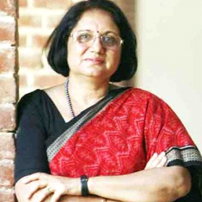
Dr. Pratibha Jolly
Principal at Miranda House
India
Dr. Pratibha Jolly is Principal of Miranda House, the premiere college for women at University of Delhi. She gained Ph.D for theoretical work in Chemical Physics from University of Delhi and taught in Miranda House for eight years before joining Department of Physics at the University of Delhi as Research Scientist where she began work in the area of Physics Education Research and Curriculum Development at the tertiary level. Her research interests include computational physics; electronic instrumentation; use of computer-based technologies in education; development of locally produced low-cost equipment; teacher training; cognitive aspects of students’ learning and diverse student populations. A major thrust has been to engage undergraduate students in development of a package called Science Online consisting of an indigenous low-cost data-acquisition system and comprehensive set of sensor circuits for real-time measurements in multidisciplinary contexts.
Her multifaceted work has led to the establishment in 2008 of the D S Kothari Centre for Research and Innovation in Science Education at Miranda House with generous funding from the Department of Science and Technology. She has recently been selected for the prestigious 2009-2010 Fulbright New Century Scholar award to work on the theme The University as Innovation Driver and Knowledge Centre. This will enable her to work with a multidisciplinary team of 36 scholars from 22 countries in the coming months.
Dr. Jolly is currently Chair of the International Commission on Physics Education (ICPE), Commission 14 of the International Union for Pure and Applied Physics (IUPAP). She has the distinction of having been member of ICPE from 2002 to 2005; being elected as Chair from 2005 to 2008 and then, being re-elected to Chair for a further period of three years till 2011. She also served as Vice President of IUPAP for a period of three years from October 2005 to 2008. She is the National Point of Contact for the Asian Physics Education Network (ASPEN), promoted by UNESCO.
Widely traveled, Dr. Jolly was awarded the Kilambi Ramavataram Fellowship by American Physical Society and the Tata-Fulbright travel fellowship in 1995 to enable work with leading Physics Education Research Groups at University of Maryland and Kansas State University. This supplemented an earlier exposure to science education at, both, school and tertiary level in the U.K. where she worked with the Science Education Group at University of York on a Commonwealth Academic Staff Fellowship in 1987.
Dr. Jolly was the General Secretary of Indian Association of Physics Teachers (IAPT), an academic body of nearly four thousand teachers spread across the country, from 2003 to 2006. She has served on apex academic committees at the University of Delhi and is a key player in academic reforms and restructuring of the science programs. She regularly interacts with schools, colleges and other educational institutions. She was on the Board of School of Science, Indira Gandhi National Open University and Advisor for publication of school study materials by Encyclopedia Brittanica, South Asia. She is on the programme committee of the National Science Museum in Delhi. She also serves on the various Department of Science and Technology (DST) Committees on Women in Science; Science and Society, and Science Communication. She was on the National Committee for the organization of the UNESCO International Year of Physics (2005) activities in India.
Dr. Jolly organized the first ever major International Conference on Physics Education titled World View on Physics Education in 2005: Focusing on Change in Delhi in August 2005. She was also the co-chair for the Physics Education segment in the World Conference on Physics and Sustainable Development held in October 2005 at Durban and is member of the group responsible for implementation of its action plans. In furtherance of these plans, she is organizing, with an international team, PHYSWARE, the first in a series of collaborative workshops on low-cost equipment and appropriate technologies that promote undergraduate level, hands-on physics education throughout the developing world at the Abdul Salam Centre for Theoretical Physics at Trieste, Italy, in February 2009.